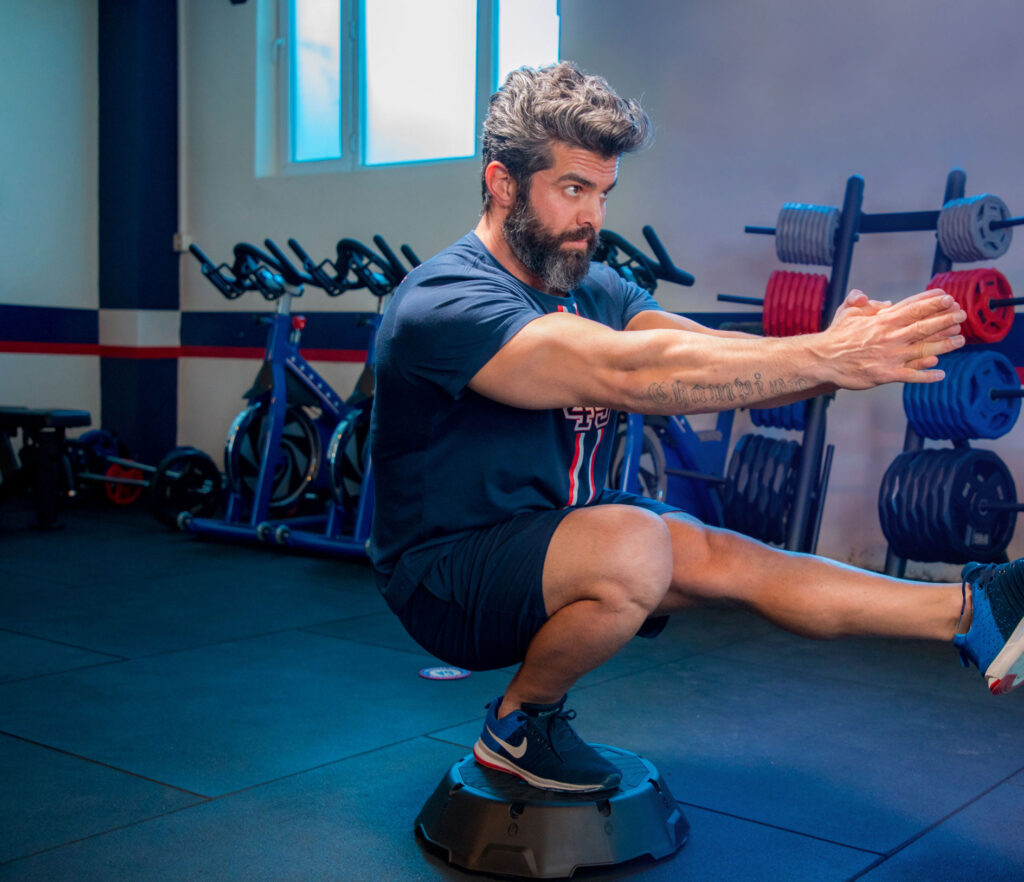Work out to Work up

By Samantha McCarthy, a motivational fitness leader focused on holistic health and empowering women to take control of their health journey.
It is 5:00 am when your alarm goes off, but you’re already awake. You haven’t been sleeping well, and for the past thirty minutes, you have been anxiously going over in your mind the proposal your team will present to potential investors this morning. As you sluggishly rise from bed, you remind yourself to bring coffee to the office today for an extra jolt of energy for the afternoon slumps that have become more frequent. And maybe some candy or a cookie since you have been more stressed and lethargic these days. While the effect doesn’t last, sometimes sweets are a mini pick-me-up. You seem to drag through the day, watching the clock in anticipation of when you will go home. You truly do enjoy your work, but motivation and productivity feel hard to come by these days.
Now imagine yourself in a different scenario.
It is 5:00 am, and you wake to your alarm. What a great night of sleep! As you jump out of bed, you mentally go through the day’s checklist and are excited as you think about the challenges that lay ahead. Another day of work, and you can’t wait. You have been aiming for a promotion, and it seems like each day, your productivity increases. Your co-workers appear to slow down after lunch, but you catch a second wind and are able to focus. Oftentimes, you are even caught off guard when 5 o’clock rolls around because you have been delightfully engrossed in your work.

“When you feel great physically, mentally, and emotionally, you are bound to see your mindset at work shift positively.”
The difference isn’t that one is a morning person and the other a night owl. It is not about job skills or work experience. Age isn’t a factor, and neither is gender. What sets the second scenario apart from the first, is your commitment to exercise.
It may seem that physical activity decreases productivity. It’s not something you can just squeeze in when you have a few minutes. Exercising takes time and energy, which may seem to be in short supply these days. But research reveals the opposite. Physical fitness increases productivity because when you train your body, you train your brain!
It is recommended that adults exercise each week for at least 150 minutes at a moderate-intensity, 75 minutes at a vigorous-intensity, or an equivalent combination.
Children and teenagers should be active for at least an hour every day. Moderate-intensity activities include dancing, walking briskly (5.5 km per hour), and jumping ropes. Examples of vigorous-intensity activity include biking, hiking, running (8 km/h), swimming, aerobics, and playing soccer. Here are four ways exercise increases productivity-
- Less sick days
We have all returned to work after a sick day and felt overwhelmed by the pile of tasks on our desks that we have fallen behind on. But regular physical activity helps keep us on track.
When we exercise, we increase our immune response and improve aerobic capacity. This decreases our chances of getting the common cold, flu, and other illnesses. Our strengthened immune system helps reduce our risk while also improving our ability to fight off illnesses when we do get sick.
Regular exercise also lowers bad cholesterol levels, and raises good cholesterol levels, promoting heart health. It helps strengthen our heart, allowing us (and our heart) to work at a higher intensity and for a longer duration.
Exercise also decreases blood pressure. Because these positive changes from exercise lower our risk of heart disease, stroke, obesity, diabetes, asthma, chronic pains, and some cancers, physical activity helps us return to work day after day and not fall behind in our tasks.
“It is not about job skills or work experience. Age isn’t a factor, and neither is gender. What sets the second scenario apart from the first, is your commitment to exercise.”
- Stress management and mood elevator
Think again about the first scenario, when you weren’t sleeping well and would anxiously go over your daily tasks before even getting out of bed.
For most of us, our work is not easy. We have budgets, deadlines, bosses evaluating our work, and co-workers with whom we may not always see eye to eye. There may be additional factors in the home, environment, or our social settings causing additional stress.
We are experiencing this globally as we live through a pandemic and establish new norms. When we aren’t managing stress well, we have trouble focusing and thinking clearly. It can even be difficult to make rational decisions.
Cortisol is the body’s stress hormone, like our own built-in alarm system. It controls our mood and motivation while also altering or shutting down different functions that may get in the way when our body is on high alert.
Usually, after the pressure or danger of a scenario has passed, our cortisol levels return to normal. But under constant stress, levels can remain elevated and lead to a number of health problems like anxiety, depression, trouble sleeping, and headaches, to name a few.
We can’t avoid stress altogether! Sometimes a little pressure, like a deadline or competition, can increase our motivation. That’s good stress. But we do want to manage the stress in our lives in order to live well and avoid chronic stress.
“Regular exercise relieves mild anxiety and depression and increases a general sense of well- being. Exercise doesn’t have to be long or hard to be effective, just consistent.”

Exercise reduces cortisol levels in the body and helps us manage stress effectively. Serotonin is another hormone that works in tandem with cortisol and is released during exercise. It is a mood stabilizer that helps reduce depression, regulate anxiety, and improve the state of mind. But with serotonin, we want to avoid low levels.
A study among assembly-line workers showed that a daily supervised 10-minute stretching program resulted in significant reductions in anger, depression, and a lift in overall mood.
Another study showed that a long sitting time for office workers was linked to decreased mental well-being. Regular exercise relieves mild anxiety and depression and increases a general sense of well-being. Exercise doesn’t have to be long or hard to be effective, just consistent.
- Increased Learning Capacity
Just like with serotonin and cortisol, exercise balances chemicals in the brain. Some increase, some decrease, but these chemicals have a tremendous influence on brain activity related to attention, learning, and motivation.
For instance, when we exercise, our brain is flooded with BDNF (brain-derived neurotrophic factor) which increases brain cells’ growth and improves the connections between them. The brain needs these connections to absorb, process, remember and use information. In the same way, we feed our bodies with food, feeding our brain with exercise helps us be more effective and efficient. With a well-fed brain, you focus better, improve your concentration, learn more quickly, enhance your creativity, and sharpen your memory.
Furthermore, exercise improves sleep quality, which means you can wake up rested and prepared for the day ahead.
In a nine-month study of 80 executives, those who exercised saw a 70% improvement in their ability to make difficult decisions. Another study showed that participants improved their time management and workload completed by 72% on the days they exercised.
“With a well-fed brain, you focus better, improve your concentration, learn more quickly, enhance your creativity, and sharpen your memory.”
- Getting Started
Even with these facts before you, starting a new exercise regimen can seem overwhelming. You may desire the second scenario we imagined to be true earlier, but you don’t know where to start.
Here are a few suggestions to make exercise a part of your day:
- Schedule it into your day
Planning ahead makes you significantly more likely to accomplish your goal of regular exercise.
The night before, you can set out your gym shoes and workout clothes. And be sure to bring the items to work so you can head straight to the gym afterward. As Benjamin Franklin said, “if you fail to plan, you are planning to fail.”
- Join an F45 Studio
You don’t have to be a Certified Personal Trainer or a bodybuilder in order to exercise and
stay healthy.
F45 is a one-on-one workout in a group setting, focusing on daily movement patterns using a variety of exercises. And the classes change daily so you don’t get bored. Just join a class and the trainers will walk you through the exercises, helping you maintain proper form to avoid injury while jamming out to great music. No matter your fitness level, F45 is a great place to exercise. Check out one of the studios in Kabul. f45training.af/
- Make small lifestyle changes
Take the stairs instead of an elevator. Little changes throughout the day can help increase your fitness while also improving your health and productivity. Maybe you work on the first floor, but you can still set a timer to make sure you get up and take a short walk every few hours. And bring a bottle of water to your office, so you stay hydrated!
- Try 10-minute workouts
Regular exercise doesn’t have to look like running 10 miles daily or lifting heavy weights for an hour. Research supports the idea that small periods of exercise accumulated through the day have similar benefits as one continuous workout. So have fun exploring what works for you.
- Recruit a friend or family member to join you
Whether it means getting up a little earlier in the morning or hitting the gym after work, planning to do exercise with a buddy keeps you from skipping your daily workout. Accountability keeps you honest and committed. Plus, your buddy gets to experience the same benefits as they train their body and their brain.
When you feel great physically, mentally, and emotionally, you are bound to see your mindset at work shift positively. You can take care of your body and your brain. Why not improve job performance while reducing health risks?





